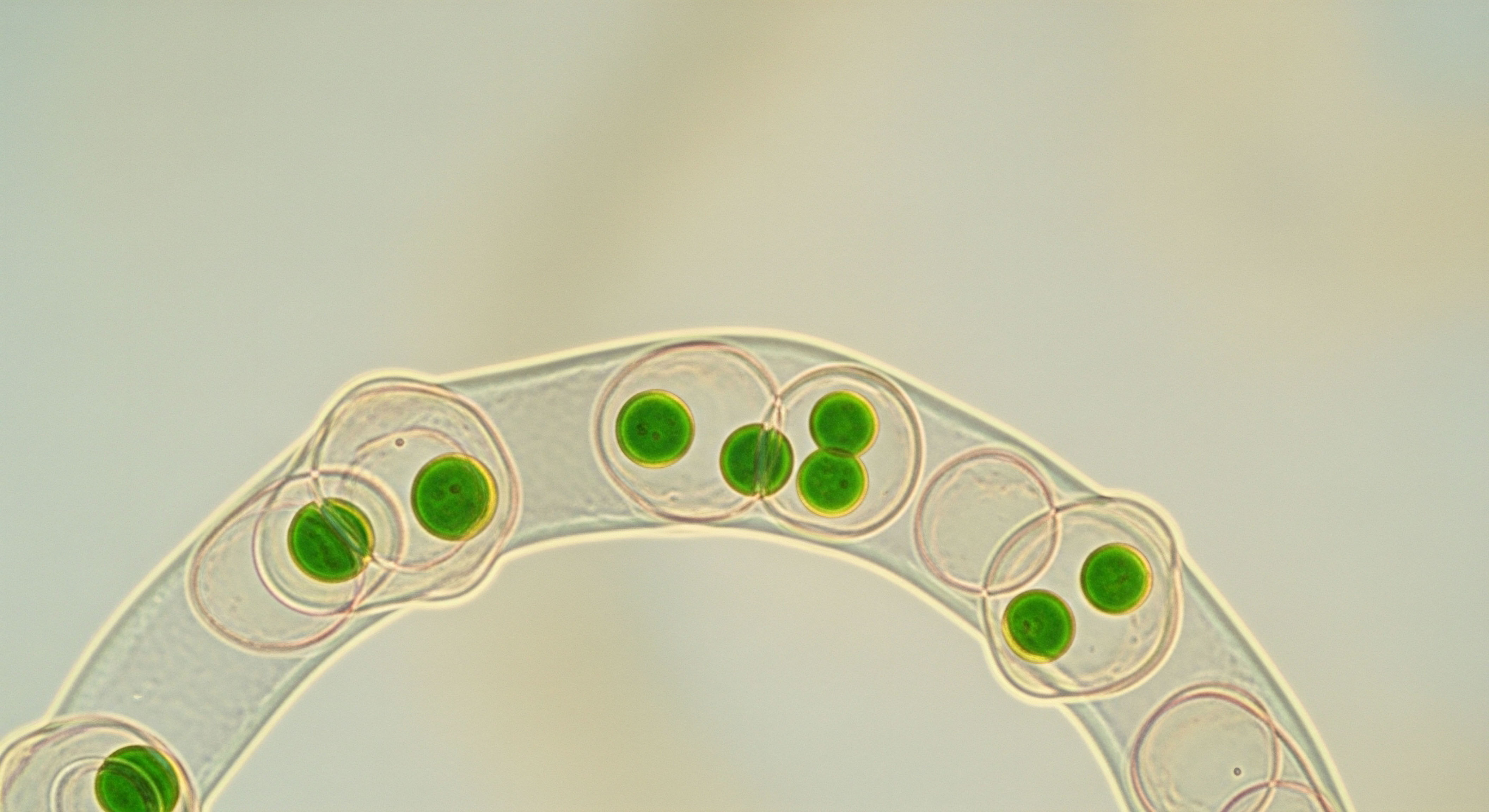

Fundamentals
When you are preparing for in vitro fertilization (IVF), the question of timing for lifestyle adjustments becomes a central focus. The human body operates on its own intricate schedule, a series of biological rhythms that dictate the development of the very cells that will one day become your child.
Understanding this internal clock is the first step in aligning your actions with your body’s needs to create the optimal environment for conception. The lead-up to an IVF cycle is a preparatory phase, a dedicated period for nurturing the biological foundations of fertility. It is a time to provide your system with the resources it needs to function at its peak.
The generally recommended timeframe to begin implementing these changes is approximately three months before your scheduled IVF cycle. This 90-day window is rooted in the fundamental biology of human reproduction. For a woman, the eggs that will be retrieved during an IVF cycle have been developing for months.
The final stages of this maturation process, where the egg becomes fully competent for fertilization, occur in the roughly three months preceding ovulation. Similarly, for a man, the process of creating mature sperm, known as spermatogenesis, takes approximately 64 to 72 days.
This means that the sperm that will be used in an IVF procedure are a direct reflection of a man’s health and lifestyle choices over the preceding two to three months. By dedicating this three-month period to positive lifestyle modifications, you are directly influencing the quality of the eggs and sperm that will be used in your treatment.
A three-month preparatory period before IVF is recommended to align with the natural development cycles of both eggs and sperm.
This preparatory phase is about more than just a single action; it is about creating a sustained period of well-being. Your body’s hormonal systems are in constant communication, and they are highly responsive to the signals they receive from your daily life.
Consistent patterns of healthy eating, regular physical activity, and effective stress management send messages of stability and resourcefulness to your reproductive system. This, in turn, can support the intricate hormonal choreography required for successful conception. Think of this time as building a foundation.
The stronger and more stable that foundation is, the more resilient the structure built upon it will be. Your commitment to these changes in the months before IVF is a direct investment in the potential for a successful outcome.
The initial consultation with a fertility specialist will mark the beginning of this journey. This appointment will involve a thorough review of your medical history and a series of tests to assess your reproductive health. These assessments may include blood work, ultrasounds to evaluate ovarian reserve, and a semen analysis for the male partner.
The results of these tests will provide a clear picture of your unique biological landscape and allow your clinical team to create a personalized treatment plan. This plan will not only outline the medical aspects of your IVF cycle but will also include guidance on the specific lifestyle adjustments that will be most beneficial for you.
This collaborative approach ensures that the changes you make are targeted and effective, giving you a sense of control and purpose as you move forward.


Intermediate
To appreciate the significance of the three-month preparatory window before IVF, it is necessary to examine the intricate biological timelines that govern gamete development. This period is a direct reflection of the physiological processes of oogenesis (egg development) and spermatogenesis (sperm development).
These are not instantaneous events; they are complex, multi-stage processes that are profoundly influenced by the body’s internal environment. The health of that environment, in turn, is a direct consequence of your lifestyle choices. By understanding the specific stages of gamete maturation, the recommendation for a 90-day preparation period becomes a clear, evidence-based strategy.

The Rationale behind the 90 Day Window
The 90-day timeframe is a clinically accepted standard because it accommodates the full cycle of development for both male and female gametes. For men, the process of spermatogenesis, from the initial division of a stem cell to a fully motile spermatozoon, takes approximately 72 days.
This means that the sperm ejaculated today are the product of lifestyle and health conditions from nearly three months ago. For women, the process is more complex. While a female is born with all the eggs she will ever have, the final maturation of a cohort of follicles, from which a dominant egg will be selected for ovulation, occurs over several months.
The last 90 days are particularly important for the quality of the oocyte as it completes its growth and prepares for fertilization.
The 90-day pre-IVF preparation period is strategically aligned with the full maturation cycles of both sperm and eggs.
During this critical window, the gametes are highly susceptible to damage from oxidative stress, a state of imbalance between free radicals and antioxidants in the body. Lifestyle factors such as a poor diet, smoking, excessive alcohol consumption, and high stress levels can increase oxidative stress, which can impair egg and sperm quality.
Conversely, a diet rich in antioxidants, regular moderate exercise, and stress reduction techniques can help to mitigate this damage and support the development of healthy gametes. This is why a sustained period of healthy living is so impactful; it provides a continuous supply of the building blocks for healthy cells and protects them from harm during their most vulnerable developmental stages.

Key Lifestyle Modifications and Their Mechanisms
The lifestyle changes recommended before IVF are not arbitrary; each one has a specific biological mechanism of action that contributes to improved reproductive outcomes. These modifications work synergistically to create a fertile internal environment, enhancing the potential for a successful pregnancy.
- Nutrition A diet rich in whole foods, including fruits, vegetables, lean proteins, and healthy fats, provides the essential vitamins, minerals, and antioxidants needed for optimal reproductive function. Nutrients like folate and B vitamins are crucial for DNA methylation, a process that regulates gene expression in the developing embryo. Omega-3 fatty acids, found in fish and flaxseeds, help to balance hormones and reduce inflammation.
- Exercise Moderate physical activity improves blood circulation, which ensures that the reproductive organs receive a steady supply of oxygen and nutrients. It also helps to maintain a healthy body weight, as being overweight or underweight can disrupt ovulation and decrease fertility. Exercise is also a potent stress reducer, which helps to regulate cortisol levels and support hormonal balance.
- Stress Management Chronic stress can lead to elevated levels of cortisol, a hormone that can interfere with the production of reproductive hormones. Practices such as yoga, meditation, and mindfulness can help to lower cortisol levels and promote a state of relaxation, which is more conducive to conception. Prioritizing sleep is also essential, as sleep deprivation can disrupt hormone production and increase stress.
- Avoidance of Harmful Substances Alcohol, tobacco, and recreational drugs can have a profound negative impact on fertility. Smoking has been shown to reduce IVF success rates by as much as 50%. Alcohol can disrupt hormone levels and increase the risk of miscarriage. Limiting caffeine intake is also advisable, as high levels have been associated with decreased fertility.
By implementing these changes consistently over a three-month period, you are actively participating in the creation of the highest quality gametes possible. This proactive approach can have a significant impact on your IVF journey, increasing your chances of a successful outcome.
| Timeframe | Biological Focus | Key Actions |
|---|---|---|
| 3+ Months Out | Spermatogenesis & Oocyte Maturation | Adopt a nutrient-dense diet, begin a moderate exercise regimen, cease smoking and recreational drug use, limit alcohol and caffeine. |
| 1-3 Months Out | Hormonal Regulation & Stress Reduction | Incorporate stress management techniques, prioritize 7-8 hours of sleep per night, continue with diet and exercise. |
| IVF Cycle | Uterine Receptivity & Implantation Support | Continue all positive lifestyle habits, avoid strenuous exercise, and follow all clinical instructions precisely. |


Academic
The recommendation for a three-month preparatory period before IVF is grounded in a deep understanding of reproductive physiology, but a more sophisticated layer of this rationale is found in the field of epigenetics. Epigenetics explores how environmental and lifestyle factors can induce changes in gene expression without altering the underlying DNA sequence itself.
These modifications, which include DNA methylation and histone modifications, play a critical role in gametogenesis and early embryonic development. The 90-day window before IVF is, therefore, a crucial period for influencing the epigenetic programming of both oocytes and sperm, which can have lasting consequences for embryo viability and the health of the resulting offspring.

Epigenetic Reprogramming during Gametogenesis
Gametogenesis is a period of extensive epigenetic reprogramming. As primordial germ cells develop into mature eggs and sperm, their epigenetic marks are erased and then re-established in a sex-specific pattern. This process is essential for ensuring that the resulting embryo has the correct gene expression profile for healthy development.
However, this period of reprogramming is also a window of vulnerability. Environmental exposures and lifestyle factors can interfere with this delicate process, leading to aberrant epigenetic marks that can compromise fertility and embryonic health.
For instance, studies have shown that paternal obesity can alter the methylation patterns in sperm, which may increase the risk of metabolic disorders in the offspring. Similarly, maternal diet can influence the epigenetic profile of the oocyte, with deficiencies in nutrients like folate and B vitamins leading to improper DNA methylation.
These epigenetic alterations can affect the expression of genes that are critical for implantation, placental development, and fetal growth. By optimizing lifestyle factors in the months leading up to IVF, individuals can support the fidelity of this epigenetic reprogramming process, thereby enhancing the quality of their gametes and the potential for a healthy pregnancy.

What Are the Epigenetic Consequences of Preconception Lifestyle Choices in China?
In the context of China, where IVF is an increasingly common path to parenthood, understanding the interplay between lifestyle, environment, and epigenetics is of particular importance. Rapid industrialization has led to increased exposure to environmental pollutants, such as particulate matter and heavy metals, which have been shown to induce epigenetic changes that can impair reproductive health.
Furthermore, the adoption of more sedentary lifestyles and Westernized diets can contribute to metabolic and inflammatory states that are detrimental to fertility. The legal and commercial landscape surrounding assisted reproductive technologies in China is also evolving, with a growing emphasis on preconception health as a means of improving IVF success rates and reducing the burden of reproductive disorders.
| Lifestyle Factor | Epigenetic Mechanism | Potential Reproductive Outcome |
|---|---|---|
| Diet (e.g. high-fat, low-folate) | Altered DNA methylation patterns in sperm and oocytes. | Impaired embryo development, increased risk of metabolic disease in offspring. |
| Chronic Stress | Changes in histone modifications and cortisol-mediated gene expression. | Disrupted hormonal regulation, reduced oocyte quality. |
| Environmental Toxin Exposure | Aberrant DNA methylation and interference with non-coding RNA function. | Reduced sperm count and motility, increased risk of pregnancy complications. |
| Regular Moderate Exercise | Favorable changes in DNA methylation of pro-inflammatory genes. | Improved cellular function, healthier reproductive environment. |
Epigenetic modifications induced by lifestyle choices can be passed down to future generations, highlighting the long-term significance of preconception health.
The commercialization of fertility services in China has also led to a greater awareness of the importance of personalized medicine. As our understanding of epigenetics grows, it is likely that we will see the development of new diagnostic tools that can assess an individual’s epigenetic profile and guide personalized lifestyle recommendations.
This could involve analyzing methylation patterns in sperm or follicular fluid to identify specific nutritional deficiencies or environmental exposures that may be impacting fertility. By leveraging this information, clinicians can provide more targeted and effective interventions, moving beyond generic advice to create truly personalized preconception care plans. This approach not only has the potential to improve IVF outcomes but also to promote the long-term health and well-being of both parents and their children.
The legal framework governing assisted reproductive technologies in China is also beginning to incorporate the concept of preconception care. While the focus has traditionally been on the safety and efficacy of the medical procedures themselves, there is a growing recognition that the health of the gametes is a primary determinant of success.
This is leading to a greater emphasis on patient education and the provision of comprehensive lifestyle counseling as an integral part of the IVF process. As the science of epigenetics continues to evolve, it is likely that we will see these principles become even more deeply embedded in the clinical and legal standards of care, both in China and around the world.

References
- “The Male and Female Reproductive Journey ∞ A Comprehensive Timeline.” Vertex AI Search, 16 Oct. 2024.
- “Lifestyle Changes to Make Before IVF ∞ Diet, Exercise, and Stress Management.” Vertex AI Search, 7 Feb. 2025.
- “IVF Process Timeline ∞ Step-by-Step Guide to IVF Treatment – Aksigen IVF.” Vertex AI Search.
- “Fertility Treatments & Your Lifestyle.” Vertex AI Search.
- “5 Simple Lifestyle Changes to Support IVF Treatments – Nevada Fertility Institute.” Vertex AI Search, 24 Sep. 2024.
- “The Science of Epigenetics in Fertility ∞ Can Lifestyle Choices Influence Genes?” Vertex AI Search.
- Pan, Y. et al. “The role of epigenetics in women’s reproductive health ∞ the impact of environmental factors.” Frontiers in Endocrinology, 2024.
- “Decoding the Epigenetics of Infertility ∞ Mechanisms, Environmental Influences, and Therapeutic Strategies.” Cureus, 5 Sep. 2024.
- “Epigenetics and fertility ∞ How your lifestyle choices can shape future generations.” Vertex AI Search, 2 Apr. 2025.
- “The role of epigenetics in fertility ∞ Can lifestyle choices affect future generations?” Vertex AI Search, 19 Sep. 2024.

Reflection

A New Perspective on Preparation
The knowledge that your actions today can shape the biological legacy you pass on is a profound realization. It reframes the pre-IVF period, shifting the focus from a checklist of tasks to a conscious cultivation of well-being.
This is an opportunity to connect with your body on a deeper level, to listen to its signals and respond with intention. The journey to parenthood is unique for every individual, and the path you walk is your own. The information presented here is a map, but you are the one who will navigate the terrain.
As you move forward, consider what it means to create an environment, both internal and external, that supports life. This period of preparation is a powerful act of creation, a testament to your commitment to bringing a new life into the world. It is a time of quiet strength, of patient cultivation, and of profound hope.



